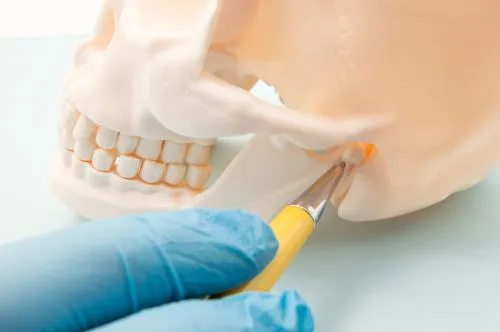
What Chiropractic Patients Want to Know About TMJ Disorders
Asking questions is the best way to learn, of course, and chiropractic patients often ask questions about some of the health issues they face. Some chiropractic patients are curious about back problems, for example, because chiropractors are well known for being extremely knowledgeable when it comes to spine health and the musculoskeletal system. A few chiropractic patients want to know about TMJ disorders.
Here are a few of the most common things chiropractic patients want to know about TMJ disorders.
Chiropractic Patients Most Frequently Asked Questions about TMJ Disorders
What is a TMJ disorder?
A TMJ disorder affects the temporomandibular joint (TMJ), which is the joint where the jawbone connects to the head, just in front of the ear. The bones and muscles of the TMJ allow the jaw to move up and down, and side to side, enabling a person to talk, chew and yawn.
TMJ disorders (TMDs) can cause pain in the jaw joint and in the muscles that control the movement of the jaw.
How common are TMJ problems?
About 12 percent of the population experiences symptoms of TMJ at any given time, according to the TMJ Association.
What causes TMJ disorders?
There are several known causes of TMJ disorders, including:
Trauma to the jaw or temporomandibular joint
Infections
Dental procedures, especially those that require the mouth be open for a long time
Insertion of a breathing tube prior to surgery
Arthritis
Misalignments of the jaw
Grinding teeth, known as bruxism, may cause TMJ disorders but not everyone who grinds their teeth develops a TMD.
Medical professionals may not be able to determine the underlying cause of TMJ disorders in many cases but chiropractors can treat TMJ disorders even if the cause cannot be determined.
What are the symptoms of TMJ disorder?
Many people with TMD describe their symptoms as a dull, aching pain that comes and goes in their jaw joint and in nearby areas. Some people with TMJ disorders do not experience pain but have trouble moving their jaws.
Other common symptoms of TMJ disorders include:
Pain or stiffness in the jaw muscles
Chronic headaches
Neck, shoulder pain
Clicking, popping or grating of the jaw joint when the individual opens or closes his or her mouth
Limited movement of the jaw
“Locking” of the jaw
Tinnitus, which includes ear pain, fullness, pressure and ringing in the ears
Dizziness, vision problems
A bite that feels “off” when the person closes his or her mouth
What is the treatment for TMJ disorders?
The best way to treat TMJ disorders is to eat soft foods, ice the affected area with ice packs to ease pain and try to avoid extreme jaw movements, such as chewing gum or yawning.
Can a chiropractor treat TMJ disorders?
Yes, chiropractic safely and effectively treats TMJ disorders. A chiropractor will perform a full evaluation of the patient’s temporomandibular joint and surrounding bones, muscles, tendons and ligaments to assess the full scope of the TMJ problem and determine its underlying causes. The chiropractor can then suggest a range of treatments that can include stretches and exercises that alleviate pain and melt stiffness in the jaw joint. The chiropractor can also detect and address any misalignments that may be contributing to TMJ pain.
For more information about the temporomandibular joint, TMJ disorders and chiropractic for TMJ problems, contact a chiropractor with experience in diagnosing and treating TMJ problems.
This article is copyrighted by Blogging Chiropractors for its Doctor of Chiropractic members and may not be copied or duplicated in any manner including printed or electronic media, regardless of whether for a fee or gratis without the prior written permission of Blogging Chiropractors.
Office Hours
Mon 8:00-12:30, 2:30-7pm
Tues 8:00-12:30, 2:30-7pm
Wed 8:00-12:30, 2:30-7pm
Thurs 8:00-12:30, 2:30-7pm
Fri - Sun Closed
© 2024 Gonstead Chiropractic Center - All Rights Reserved



